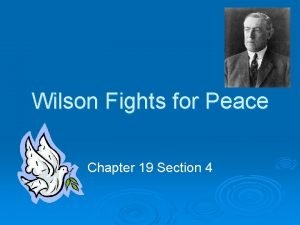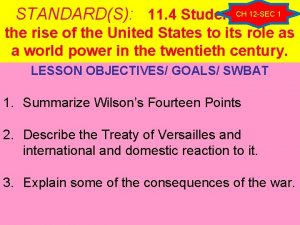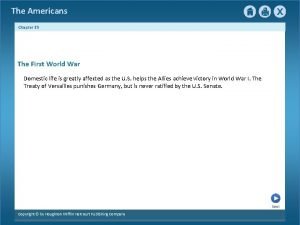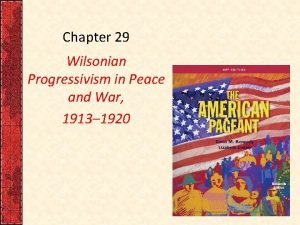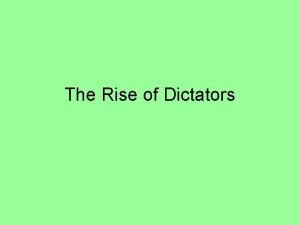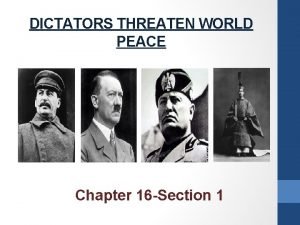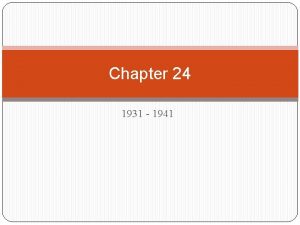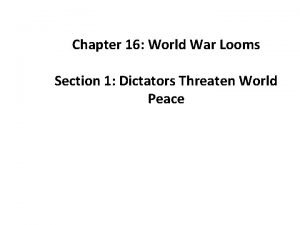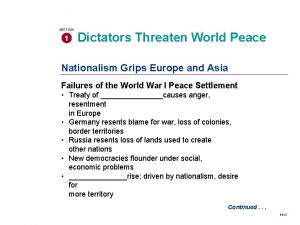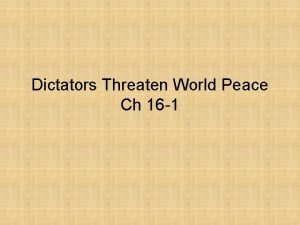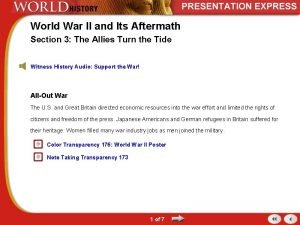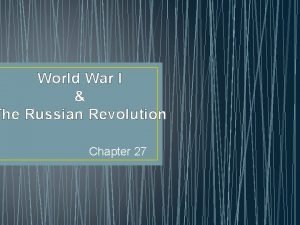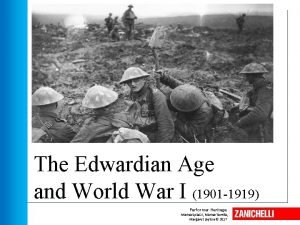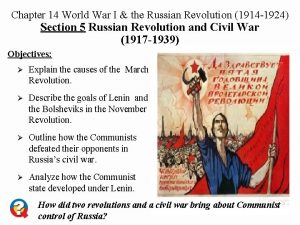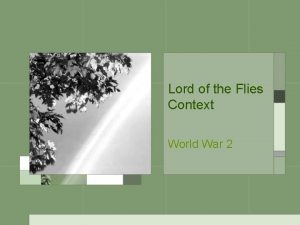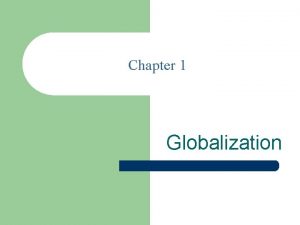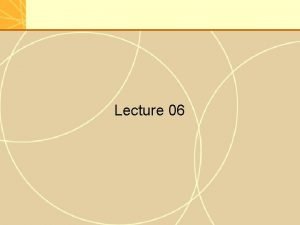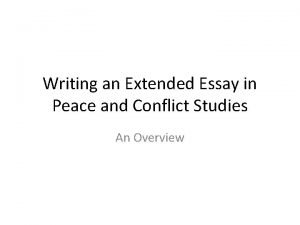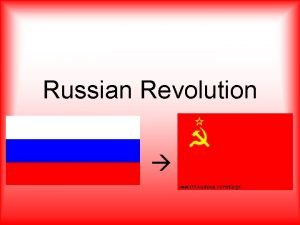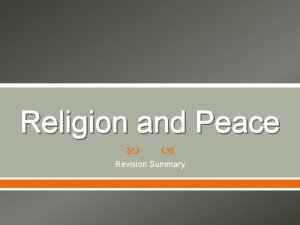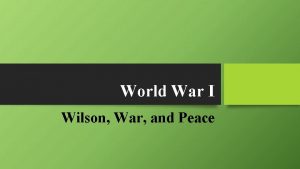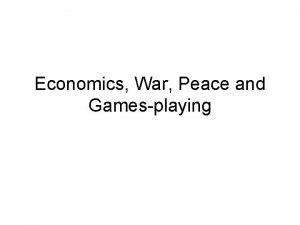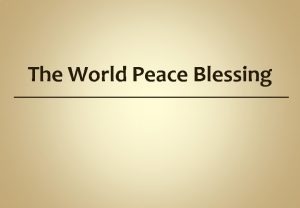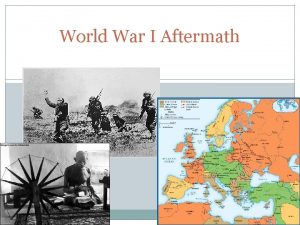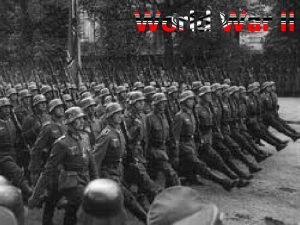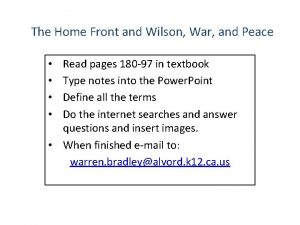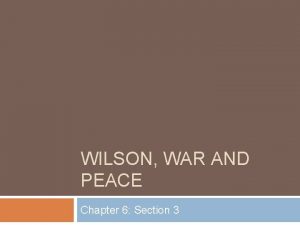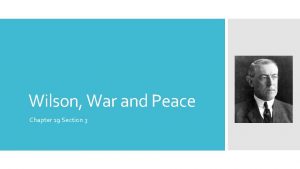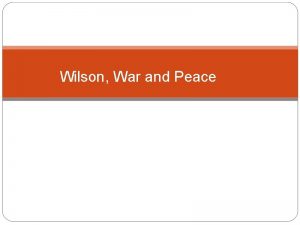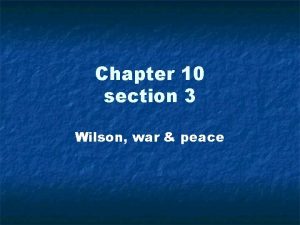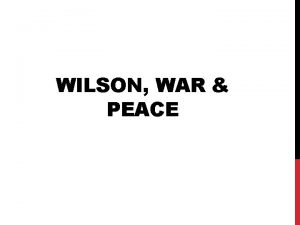World War I Wilson War and Peace Giving



























- Slides: 27

World War I Wilson, War, and Peace

Giving the Allies an Edge • By the time the US entered World War I, the conflict had become a deadly, bloody stalemate • On the Western Front in France, both sides had tried desperately to break the stalemate and failed • It would take the US entry into the war to turn the tide toward and Allied victory

Giving the Allies and Edge • To European leaders, the United States was a relative unknown • Many doubted the US could raise, train, equip, and transport an army fast enough to influence the outcome of the war • Desperate German military leaders renewed unrestricted submarine warfare trying to end the conflict before the US got involved

Convoys Protect Shipping • The Allies felt the impact of submarine warfare as the Germans sank more merchant ships faster than replacements could be built • The Allies finally adopted the convoy system (groups of merchant ships sailing together protected by warships)

Convoys Protect Shipping • Convoys had an immediate impact on the war • Convoys made up of British and American ships proved to be an instant success • Shipping losses from U-boat attacks fell sharply and Germany’s gamble failed

The Allies Struggle • The battle on land began to swing in the favor of the Central Powers • The Allies were exhausted by years of combat and the Russia was torn by civil war • March 1917: a moderate, democratic revolution had overthrown Czar Nicholas II but kept Russia in the war

The Allies Struggle • November 1917: radical communists led by Vladimir Lenin staged a revolution and gained control of Russia • Lenin pulled Russia out of the war in December, and on March 3, 1918 the Treaty of Brest-Litovsk ended the war between the Soviet Union and Germany • With the end of the war on the Eastern Front, Germany began moving soldiers to the Western Front

The Allies Struggle • With more soldiers coming to the Western Front, the Germans launched an all-out offensive in the Spring of 1918 • The fierce attacks threatened to break through Allied defenses and open a path to Paris

American Troops Join the Fight • General John J. Pershing, the commander of American forces in Europe, arrived in France in June 1917 • American troops did not arrive in France in large numbers until early 1918 • By March 1918, Allied counterattacks and German exhaustion ended the great German offensive

American’s Distinguish Themselves • American troops called “doughboys” saw significant action in the late spring and summer of 1918 • The Americans participated in both offensive and defensive battles, and though it took time they learned quickly and fought bravely

American’s Distinguish Themselves • One of America’s greatest war heroes was Alvin York from Tennessee • While trapped behind enemy lines, York and 16 other soldiers attacked several machine-gun nests • When the fighting was over, York and his fellow soldiers had taken the German position which earned him the Congressional Medal of Honor

American’s Distinguish Themselves • African Americans fought bravely during the war, despite facing discrimination in the US Army • By the end of the war, 1. 3 million American soldiers had served on the front, more than 50, 000 had died, and about 230, 000 had been wounded

The War Ends • The American troops gave the Allies a military advantage • By the fall of 1918, German and Austro-Hungarian armies had enough, and many men deserted, mutinied, or refused to fight • On November 11, 1918 Germany surrendered to the Allies in a railway car in Compiegne

The War Ends • Of the millions of troops who mobilized, almost 5 million Allied and 8 million Central Power troops were dead • Wounded: Allied- 12 million, Central Powers- 8 million • Nearly 6. 5 million civilians died in the terrible conflict

Peace Without Victory • Vladimir Lenin maintained that the war was nothing more than an imperialistic land-grab • He revealed secret treaties Russia made with the other Allies where they agreed to divide the German and Ottoman Empires

Peace Without Victory • For President Wilson, the war was about peace and freedom • January 1917: Wilson introduced the idea of “peace without victory” to Congress • “Victory would mean peace forced upon the loser…and would leave a sting, a resentment, a bitter memory upon which terms of peace would rest…”

Peace Without Victory • January 1918: Wilson outlined for Congress his Fourteen Points which outlined his idea of “peace without victory” • Fourteen Points encouraged openness, independence, and supporting freedom • Wilson wanted open diplomacy, freedom of the seas, free trade, reduction of arms, and ending colonialism

Peace Without Victory • Wilson championed self-determination (the right of people to choose their own form of government) • He asked for a League of Nations to secure “mutual guarantees of political independence and territorial integrity to great and small states alike” • In 1919, Wilson traveled to Versailles to represent the US at the peace conference

Wilson at the Peace Conference • The Allied leaders at the Peace Conference were known as the Big Four • • Woodrow Wilson (US) David Lloyd-George (Britain) Georges Clemenceau (France) Vittorio Orlando (Italy)

Wilson at the Peace Conference • Wilson’s idealism did not inspire the other Allied leaders • They blamed Germany for starting the war and felt that Germany make reparations (payments for war damages) • They wished to weaken Germany so that it would never threaten Europe again

Wilson at the Peace Conference • Lloyd-George wished to preserve the colonial status quo while Clemenceau wished for Germany to pay dearly and return Alsace-Lorraine • The Allied leaders chipped away at Wilson’s Fourteen Points, but Wilson kept pushing for a League of Nations • Wilson refused to compromise on the League, and the Allies finally voted to make the League part of the treaty

Problems With the Peace • The Versailles treaty created as many problems as it solved • The new map of Europe that emerged violated self-determination as often as it was confirmed • In the Middle East, several ethnic groups were clustered together randomly

America Rejects the Treaty • Wilson knew the treaty was not perfect, but he hoped the League could correct its problems • Many German Americans thought the treaty was too harsh Germany • Irish Americans criticized the failure of creating an independent Ireland

America Rejects the Treaty • Wilson’s biggest hurdle was the fact the treaty had to be submitted to the Republican-controlled Senate • Some senators believed the US should not get involved in world politics or world organizations • Many of these “isolationist” senators opposed the League of Nations, particularly Article 10 which called for mutual defense of member nations

America Rejects the Treaty • Henry Cabot Lodge led another group of senators called “reservationists” who opposed the treaty as it was written • Many reservationists believed Article 10 would lead the US into war without the consent of Congress • These senators did agree to vote for the treaty if revisions were made, however Wilson was not willing to compromise

America Rejects the Treaty • When the Senate delayed ratifications, Wilson went directly to the people • Though he was sick, Wilson crossed the country giving 32 addresses in 33 days

America Rejects the Treaty • Wilson’s health failed on September 25, 1919 and he suffered a debilitating stroke • In November 1919 the treaty was brought before the Senate and rejected • Most senators were not isolationists, however at a moment that demanded compromise, Wilson and his opponents refused to do so • Without full American support, the League of Nations was unable to maintain peace among nations
 Wilson fights for peace
Wilson fights for peace Why did the allies reject wilson's peace plan
Why did the allies reject wilson's peace plan Chapter 19 section 4 wilson fights for peace
Chapter 19 section 4 wilson fights for peace Wilsonian progressivism in peace and war
Wilsonian progressivism in peace and war War and peace ending
War and peace ending What does jesus say about war and peace
What does jesus say about war and peace Interreligious and international federation for world peace
Interreligious and international federation for world peace Types of dictatorship
Types of dictatorship Chapter 16 dictators threaten world peace
Chapter 16 dictators threaten world peace World war looms chapter 24
World war looms chapter 24 Christ, be our light
Christ, be our light Dictators threaten world peace
Dictators threaten world peace Chapter 16 building vocabulary world war looms
Chapter 16 building vocabulary world war looms Dictators threaten world peace
Dictators threaten world peace Chapter 16 dictators threaten world peace
Chapter 16 dictators threaten world peace Chapter 16 lesson 2 challenges to slavery
Chapter 16 lesson 2 challenges to slavery World war ii and its aftermath section 1 quiz
World war ii and its aftermath section 1 quiz World war 1 and the russian revolution chapter 27
World war 1 and the russian revolution chapter 27 The edwardian age zanichelli
The edwardian age zanichelli Kzbho6asboc -site:youtube.com
Kzbho6asboc -site:youtube.com Lord of the flies and world war 2
Lord of the flies and world war 2 Ap world history chapter 25 africa and the atlantic world
Ap world history chapter 25 africa and the atlantic world The changing world output and world trade picture
The changing world output and world trade picture The changing world output and world trade picture
The changing world output and world trade picture Peace and conflict essay
Peace and conflict essay Christianity vs catholicism
Christianity vs catholicism Peace bread and land
Peace bread and land Religion and peace essay hsc
Religion and peace essay hsc
